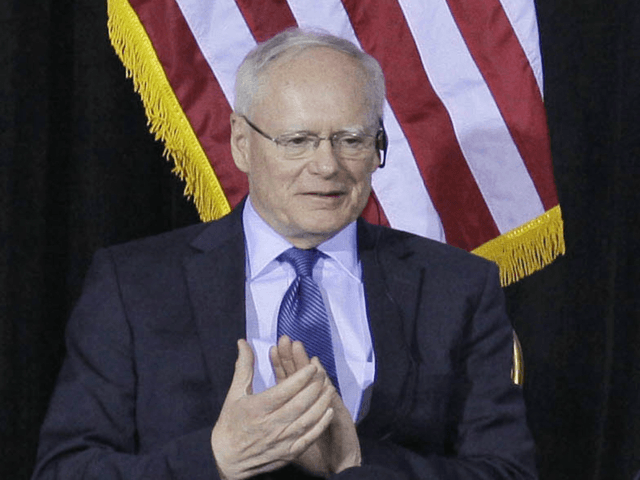Ambassador Jim Jeffrey, formerly the American ambassador to Turkey and now special envoy to Syria, said on Thursday the Trump administration is determined to retain a military presence in Syria until the “enduring defeat” of the Islamic State has been secured.
“This means we are not in a hurry to pull out,” Jeffrey said, adding that while President Donald Trump said he wanted to “get out” of Syria five months ago, he is fully “on board” with keeping U.S. troops in the country for the foreseeable future.
Jeffrey talked at length about the “very dangerous” situation in the Syrian province of Idlib, where dictator Bashar Assad and his allies from Russia and Iran are preparing for a major military offensive against the last rebel strongholds.
Jeffrey warned that the use of chemical weapons by Assad or his allies would constitute a “reckless escalation” of the conflict.
“I am very sure that we have very, very good grounds to be making these warnings. There is lots of evidence that chemical weapons are being prepared,” he said.
“I think the last chapter of the Idlib story has not been written. The Turks are trying to find a way out. The Turks have shown a great deal of resistance to an attack,” he added.
As former ambassador to Turkey, Jeffrey is well-positioned to overcome Washington’s disagreements with Ankara and make common cause with the Turks over Idlib. Turkey has expressed great apprehension about the danger of mass slaughter and a new refugee crisis in Idlib.
At a meeting in Tehran between Iranian, Russian, and Turkish leaders on Friday, Russian President Vladimir Putin rejected Turkish President Recep Tayyip Erdogan’s call for a cease-fire to avert a “bloodbath” in Idlib.
Ambassador Jeffrey also has extensive experience in Iraq and was opposed to then-President Barack Obama’s decision to withdraw U.S. troops in 2011, setting the stage for the Islamic State to come roaring into Iraq and establish a new wing of its “caliphate.” Jeffrey presciently worried that American withdrawal would create an opportunity for Iran to extend its influence in Iraq. He faces a similar dynamic in Syria.
Jeffrey was also bluntly skeptical of what he saw as President Trump’s strategy to enlist Putin’s help in kicking Iran out of Syria, as the Jerusalem Post recalled:
“It runs against several problems,” said Jeffrey. “Trump is seeming to offer some sort of recognition of Crimea – but there’s a whole set of sanctions that are congressional, and a whole set that are European. Neither will not go along with this. And how are the Russians going to get the Iranians out?”
“Putin is out to undermine the entire US security system in the Middle East, and Trump keeps allowing him to do this, as Obama did but in different ways,” Jeffrey continued. “Trump thinks he can get everything without any cost, and that’s a great fallacy in diplomacy.”
This week Jeffrey made his first trip to the Middle East since taking the Syrian envoy position, including stops in Israel, Jordan, and Turkey. The Turks told Jeffrey that clearing Kurdish militia groups from the Turkish border region of Syria is the price of Ankara’s support.
Turkey has its own military forces in Syria augmented by allied militia groups, and it has never been fond of Bashar Assad, so it has a good deal to bring to the table. While the U.S. sees the Kurds as vital battlefield allies against the Islamic State and other terrorist groups, the Turks view Kurdish nationalism as a greater threat than the Islamic State, al-Qaeda, or Iran and its Shiite militia proxies.
The Kurds are also one of America’s best bets for preserving an effective military capability in Syria without committing U.S. troops. One of Jeffrey’s most important tasks will be judging whether an alliance with Turkey founded on mutual alarm over the impending Idlib bloodbath will be strong enough to make the withdrawal of American troops from Syria feasible once ISIS is decisively defeated.

COMMENTS
Please let us know if you're having issues with commenting.